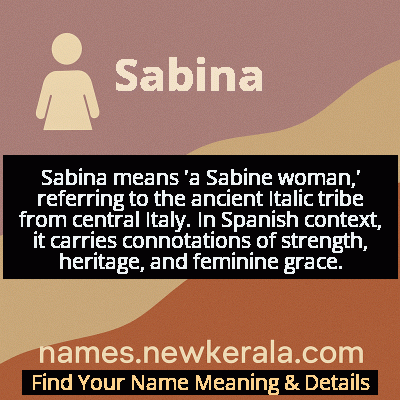Sabina Name Meaning & Details
Origin, Popularity, Numerology Analysis & Name Meaning of Sabina
Discover the origin, meaning, and cultural significance of the name SABINA. Delve into its historical roots and explore the lasting impact it has had on communities and traditions.
Name
Sabina
Gender
Female
Origin
Spanish
Lucky Number
1
Meaning of the Name - Sabina
Sabina means 'a Sabine woman,' referring to the ancient Italic tribe from central Italy. In Spanish context, it carries connotations of strength, heritage, and feminine grace.
Sabina - Complete Numerology Analysis
Your Numerology Number
Based on Pythagorean Numerology System
Ruling Planet
Sun
Positive Nature
Leaders, ambitious, highly driven, self-reliant, innovative.
Negative Traits
Overly aggressive, domineering, impatient, selfish.
Lucky Colours
Red, orange, gold.
Lucky Days
Sunday.
Lucky Stones
Ruby, garnet.
Harmony Numbers
2, 3, 9.
Best Suited Professions
Entrepreneurs, managers, engineers.
What People Like About You
Courage, determination, leadership.
Famous People Named Sabina
Sabina Spielrein
Psychoanalyst
Influential figure in early psychoanalysis who contributed significantly to child psychology theories
Sabina Guzzanti
Actress and Satirist
Prominent Italian comedian known for bold political satire and social commentary
Sabina Altynbekova
Volleyball Player
Internationally recognized athlete who gained widespread attention for her sports achievements
Sabina Classen
Musician
Trailblazing female vocalist in the male-dominated thrash metal genre
Name Variations & International Equivalents
Click on blue names to explore their detailed meanings. Gray names with will be available soon.
Cultural & Historical Significance
In Spanish-speaking cultures, Sabina maintains strong connections to Catholic tradition through Saint Sabina, a 2nd-century martyr venerated for her faith. The name also appears in Spanish literature and music, most notably through Spanish singer-songwriter Joaquín Sabina, though used differently in that context. Throughout European history, Sabina has been associated with nobility and aristocracy, appearing in royal lineages across Italy, Spain, and Central Europe, giving it an air of elegance and historical prestige that continues to resonate in modern naming practices.
Extended Personality Analysis
Women named Sabina are often perceived as possessing a unique blend of strength and grace, reflecting their namesake's historical resilience. They typically exhibit intellectual curiosity, emotional depth, and a strong sense of independence that allows them to navigate challenging situations with poise. Many Sabinas demonstrate artistic sensitivity and creative expression, whether through traditional arts, writing, or musical pursuits. Their personality often combines traditional values with modern thinking, creating individuals who respect heritage while embracing progress.
Sabinas tend to be loyal friends and partners, valuing deep connections and meaningful relationships. They often possess a quiet confidence that doesn't need constant validation, and their thoughtful nature makes them excellent listeners and advisors. The name suggests someone who balances practicality with intuition, making them both grounded and spiritually aware. This combination of traits often results in women who are both dependable and inspiring, capable of leadership while maintaining empathy and understanding toward others.
Modern Usage & Popularity
In contemporary times, Sabina maintains moderate popularity across Spanish-speaking countries and Europe, particularly in Italy, Spain, and Latin America. The name has experienced a resurgence in recent years as parents seek classic names with historical depth that aren't overly common. In the United States, Sabina remains relatively rare but has seen steady usage, often chosen by parents with European heritage or those appreciating its elegant sound and rich background. The name appeals to modern parents seeking something traditional yet distinctive, feminine but strong, with its international flair making it attractive in multicultural societies and its easy pronunciation across languages adding to its global appeal.
Symbolic & Spiritual Meanings
Symbolically, Sabina represents resilience, cultural integration, and feminine strength. The name evokes images of bridges between different worlds - much like the Sabine women who connected two warring cultures. It symbolizes the power of women as peacemakers and cultural unifiers, carrying connotations of ancient wisdom and endurance that suggest someone who can withstand challenges while maintaining grace and dignity. The name embodies the concept of transformation - from conflict to harmony, from separation to unity - suggesting a person who can adapt to changing circumstances while preserving their core identity, making it a powerful symbolic name for those who value both tradition and progress.

